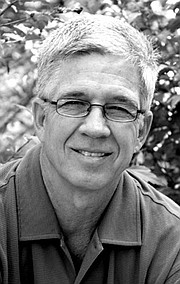Ancient Words —
The Books of Life
All of us have at some time read the record of birth entries in an old family Bible. The date of marriage is usually listed but always (I presume) the birth of each child is recorded. I have seen the entries that my grandparents made in their family Bible and without fail the entry of five children born to my mom’s parents and the entry of eight children born to my dad’s parents have been recorded.
One might say their family Bible also served as a “Book of Life” because as each child came to life, that birth day was recorded for the beginning of life. Every county (parish in Louisiana) in the U.S. maintains an official record of birth for each child coming to life in that county.
Consequently, one might say that a “Book of Life” is found in every county of America. Would God, the Creator, be any less concerned about His own creation — the human being created in His own likeness? Would God not also maintain a “Book of Life” listing the birth of each and every child coming to life from Adam, Eve, Cain, Abel….and everyone else over the past 6,000 years? Revelation 17:8 refers to a book of life “from the foundation of the world.”
Revelation 20:11-12 records: “Then I saw a great white throne and him who was seated on it. The earth and the heavens fled from his presence, and there was no place for them. And I saw the dead, great and small, standing before the throne, and books were opened. Another book was opened, which is the book of life.”
There seems to be two “Books of Life” referred to in the New Testament and Revelation. There is the “Lamb’s Book of Life” and another book called the “Book of Life.” For me, the distinction is seen when I recall Jesus’ conversation with Nicodemus in John 3. Jesus gives an answer to this ruler of the Jews, when he says, “Very truly I tell you, no one can see the kingdom of God unless they are born again.” Nicodemus asks how this can be and Jesus responds, “Very truly I tell you, no one can enter the kingdom of God unless they are born of water and the Spirit. Flesh gives birth to flesh, but the Spirit gives birth to spirit.”
I see God recording every birth of every child in His Book of Life – this is the birth of flesh. The supposedly 100 billion people born (at least since Noah by some estimates) are all recorded in God’s Book of Life – and this would be a very large book!
The Lamb’s Book of Life records all of humanity who have been born of the Spirit – being born of the Spirit by choice enters your name into the Lamb’s Book of Life. This is a large number as well with John recording in Rev. 7:9, “After this I looked, and there before me was a great multitude that no one could count, from every nation, tribe, people and language, standing before the throne and before the Lamb. They were wearing white robes and were holding palm branches in their hands.”
Understanding these two books is quite important. Jesus’ blood has atoned for sin for everyone written in the Lamb’s book. There is no judgment for those names recorded in the Lamb’s book. Jesus has forgiven, Jesus has given mercy, Jesus has given grace, Jesus has given eternal life!
John understood this and accurately wrote in 1 John 5:11-15, “And this is the testimony: God has given us eternal life, and this life is in his Son. Whoever has the Son has life; whoever does not have the Son of God does not have life. I write these things to you who believe in the name of the Son of God so that you may know that you have eternal life. This is the confidence we have in approaching God – that if we ask anything according to His will, He hears us. And if we know that He hears us – whatever we ask – we know that we have what we asked of him.”
Those names written in the Book of Life (only) stand before God to be judged by their works; this is a stand alone judgment and by each person’s works, judgment is rendered – Rev. 20:12-15. “The dead were judged according to what they had done as recorded in the books, according to their works. And death and hell were cast into the lake of fire. This is the second death. And whosoever was not found written in the book of life (their name was blotted out) was cast into the lake of fire.”
(Scott Johnson is pastor at East Faulkner Church of Christ and author of the BRG Bible).
• • •
Sparks From The Gospel Anvil
Luke 14:25-33
One of the most insistent pressures of life is the pressure of unfinished business. We hardly embark upon a project before some nettling voice whispers annoyingly within, “think you’ll ever bring this off?” On every side we are exhorted to plan ahead. But how can we plan ahead when we do not know what a day may bring?
These two parables of Jesus speak to this very theme. First there was the tower begun, but not completed. Chances are that this was to have been an elaborate farm building. But somewhere along the way the farmer had over-extended himself. His dreams outran his bankroll. Perhaps his crops had failed. He got as far as the foundation and that was it! The foundation just sat there in the ground grinning up and mocking. Then there was the king with war in his heart who discovered that he had only 10,000 men while the enemy had 20,000. Said Jesus in effect, “Would not a king in such a fix buy himself a white flag, stop talking like a hawk and begin sounding like a dove? Would he not start pressing diplomatically for peace?”
The meaning in both stories is very clear. The problem comes with the application of the point. The traditional view applies them to the Christian life. Jesus is here suggesting that a man ought to count the cost before he signs up. He is pronouncing a caution against impulsive enlistment. He is hinting that there will be hardships to face and suffering to endure. Better not to begin than having once begun to fall back. You wouldn’t like to be in the position of the farmer who started what he couldn’t finish. You wouldn’t be so foolish as to embark upon a war that you had no chance of winning. Woe to the person too ambitious for their resources!
I confess that this view has never satisfied me. This is why, even though I love the parables, I was in the ministry for 18 years before I attempted to preach on parables. Frankly, it just doesn’t sound like Jesus to surround commitment with this kind of caution. Rather I hear Him say, “Sufficient unto the day is the evil thereof” (Matthew 6:34b). Or again, “Seek ye first the Kingdom of God and His righteousness and all these things shall be added unto you”(Luke 12:31). Or, “If any man would come after me, let him deny himself and take up his cross and follow me” (Luke 9:23).
Besides, how does anyone of us know what their response to Christ will be 10, 20, 30 years from now? What if some day, God forbid, you should be approached by a man with a rifle who would ask, “Do you or do you not forsake your allegiance to the Lord Jesus Christ?” Who of us really know what our reply would be?
If one would really study the Word of God and read the gospels you could read and discover that Jesus everywhere encouraged spontaneous enlistment as a believer. Fortunately, these parables can have a different application. Men like Joseph Parker, William Barclay, Peter Jarvis and others insist that in these ancient stories Jesus speaks not of man, but of God.
They were probably spoken as Jesus was en route to Jerusalem for the last time. The climate had shifted from one of popularity to one of threatened persecution. The shadow of a cross fell upon the way. For the comfort of His disciples Jesus is saying through these stories that God can do what He sets out to do.
“Which man of you” is a Greek idiom, that means “none of you.” None of you would be so foolish as to start a building that you had no chance of finishing. None of you would be so foolish as to embark upon a war that you could not win. Well, neither would God!
The kingdom can be resisted, but it cannot be overcome. God has the means to win and God means to win. We are called to more than what we think. We are called to nothing less than the participation in “The Invincible Kingdom of God!”
This is what history is all about – God seeking to reconcile all things to Himself in Jesus Christ – to reverse the sentence of the first Adam and to establish a new humanity after the likeness of the second Adam, Jesus Christ.
(Lieutenant Charles Smith is commanding officer of the Salvation Army of El Dorado).

